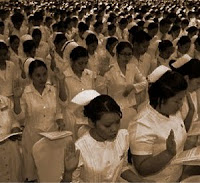The Roman Catholic Church is losing its grip on the concept of Christmas
 According to retired bishop Teodoro Bacani, Santa Claus is stealing the true spirit of Christmas and as such we are seeing this supposedly blessed holiday of Christendom "deteriorating into a shopping frenzy". Okay, padre, why don't we go back a bit and investigate what "Christmas" really is, shall we?
According to retired bishop Teodoro Bacani, Santa Claus is stealing the true spirit of Christmas and as such we are seeing this supposedly blessed holiday of Christendom "deteriorating into a shopping frenzy". Okay, padre, why don't we go back a bit and investigate what "Christmas" really is, shall we?Ask most people what they think Christmas is, and they will answer that it is the day commemorating the birth of Jesus Christ. But was Christ really born on the 25th of December? For that matter, is Christmas as we know it celebrated on that date, really a holiday introduced by the Christian faith?
According to bible records, shepherds were tending sheep on the night that Christ was born -- quite unlikely on a winter December night in Palestine.
Indeed, according to this, Christmas is a holiday by papal edict, specifically Pope Julius I who in AD 350 decreed that Christ's date of birth be de facto recognised to have transpired on the 25th of December henceforth.
Don't you just love a dictatorship? It makes for expeditious resolutions, which is specially important in largely ignorant societies where "debates" tend to routinely deteriorate to the sort of small-minded yammering most Filipinos are familiar with.
Consider what had been going on before Pope Julius's stroke of genius on those cold 25th December nights...
In ancient Babylon, the feast of the Son of Isis (Goddess of Nature) was celebrated on December 25. Raucous partying, gluttonous eating and drinking, and gift-giving were traditions of this feast.
In Rome, the Winter Solstice was celebrated many years before the birth of Christ. The Romans called their winter holiday Saturnalia, honoring Saturn, the God of Agriculture. In January, they observed the Kalends of January, which represented the triumph of life over death. This whole season was called Dies Natalis Invicti Solis, the Birthday of the Unconquered Sun. The festival season was marked by much merrymaking. It is in ancient Rome that the tradition of the Mummers was born. The Mummers were groups of costumed singers and dancers who traveled from house to house entertaining their neighbors. From this, the Christmas tradition of caroling was born.
In northern Europe, many other traditions that we now consider part of Christian worship were begun long before the participants had ever heard of Christ. The pagans of northern Europe celebrated the their own winter solstice, known as Yule. Yule was symbolic of the pagan Sun God, Mithras, being born, and was observed on the shortest day of the year. As the Sun God grew and matured, the days became longer and warmer. It was customary to light a candle to encourage Mithras, and the sun, to reappear next year.
Huge Yule logs were burned in honor of the sun. The word Yule itself means "wheel," the wheel being a pagan symbol for the sun. Mistletoe was considered a sacred plant, and the custom of kissing under the mistletoe began as a fertility ritual. Hollyberries were thought to be a food of the gods.
The tree is the one symbol that unites almost all the northern European winter solstices. Live evergreen trees were often brought into homes during the harsh winters as a reminder to inhabitants that soon their crops would grow again. Evergreen boughs were sometimes carried as totems of good luck and were often present at weddings, representing fertility. The Druids used the tree as a religious symbol, holding their sacred ceremonies while surrounding and worshipping huge trees.
So who is it that really hijacked what, padre?
You see now "Bishop" Bacani, that what goes around, comes around. Perhaps the mighty Roman Catholic Church had enjoyed 2000 years of its "wisdom" lording it over the minds of men and women. And maybe all that is coming to an end. But unlike the decline of the dominance of this much-cherished dogma of the Church, perhaps Christmas will endure. But not in the form you had come to be comfy with.




AHAHAHAHAHAHAHA!!!!!!
ReplyDeletethe roman catholicdick church is s-hitting us again LOL i love retributtals like this because it makes padres s-hitting themselves LMAO
in fact the whole thing about celebrating december 25 as the birth of christ is an answer for the catholicdicks to celebrating the feast of the Son of Isis as you mentioned above there, just like all saints day is an answer to halloween LMAO
woo DONT YOU JUST LOVE MOTHERF-UCKING RELIGIOUS CATMA???? HAHAHAHAHAHA!!!!
"give us this day our daily hamburgers with onions, pickles, cheese, and mushrooms...."
Merry "Christmas",Roman catholickdick church! HAHAHAHAHAHAHA!!!!
--yours truly, The Bluered Grinch